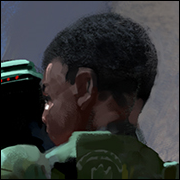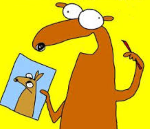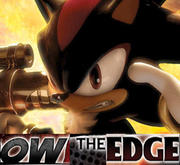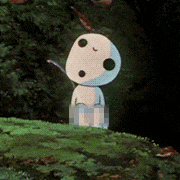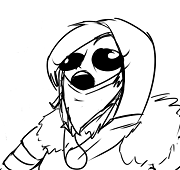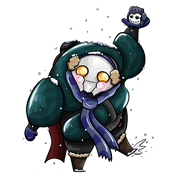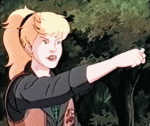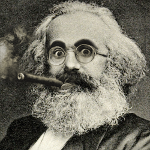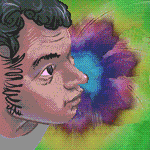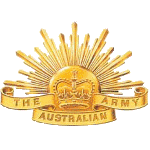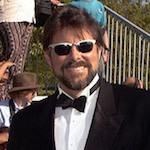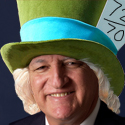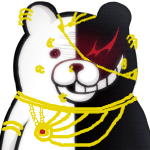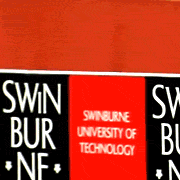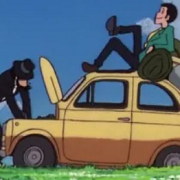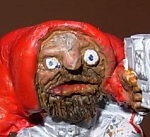|
hello i'm a bicycle rider ding ding i travel super slowly on the road during peak hour ding ding if you think this is inconvenient you are hitler ding ding
|
|
|
|
|

|
| # ? May 24, 2024 11:46 |
Sorry for being late with your latest edition of First Dog, but I was busy playing computer games instead of getting a real job.
|
|
|
|
|
Laserface posted:Yeah but my pushbike doesnt do 1:13 around Wakefield Park sooooooo Government subsidises for customised wheel rims, neon lights, and spoilers on all bikes.
|
|
|
|
dr_rat posted:Government subsidises for customised wheel rims, neon lights, and spoilers on all bikes. Literally none of those things help  well OK the spoiler might.
|
|
|
|
Milky Moor posted:hello i'm a bicycle rider "I have just as much right to be here as you do!!" - cyclist to both pedestrian and car, depending on what suits the cyclist. I am all for more cycling lanes so there aren't as many bikes on the footpaths or the roads, they don't suit either at all.
|
|
|
|
For twelve years, you have been asking: Who is John Galt? This is John Galt speaking. I am the man who loves his life. I am the man who does not sacrifice his love or his values. I am the man who has deprived you of victims and thus has destroyed your world, and if you wish to know why you are perishing-you who dread knowledge -I am the man who will now tell you.” The chief engineer was the only one able to move; he ran to a television set and struggled frantically with its dials. But the screen remained empty; the speaker had not chosen to be seen. Only his voice filled the airways of the country-of the world, thought the chief engineer-sounding as if he were speaking here, in this room, not to a group, but to one man; it was not the tone of addressing a meeting, but the tone of addressing a mind. “You have heard it said that this is an age of moral crisis. You have said it yourself, half in fear, half in hope that the words had no meaning. You have cried that man’s sins are destroying the world and you have cursed human nature for its unwillingness to practice the virtues you demanded. Since virtue, to you, consists of sacrifice, you have demanded more sacrifices at every successive disaster. In the name of a return to morality, you have sacrificed all those evils which you held as the cause of your plight. You have sacrificed justice to mercy. You have sacrificed independence to unity. You have sacrificed reason to faith. You have sacrificed wealth to need. You have sacrificed self-esteem to self-denial. You have sacrificed happiness to duty. “You have destroyed all that which you held to be evil and achieved all that which you held to be good. Why, then, do you shrink in horror from the sight of the world around you? That world is not the product of your sins, it is the product and the image of your virtues. It is your moral ideal brought into reality in its full and final perfection. You have fought for it, you have dreamed of it, and you have wished it, and I-I am the man who has granted you your wish. “Your ideal had an implacable enemy, which your code of morality was designed to destroy. I have withdrawn that enemy. I have taken it out of your way and out of your reach. I have removed the source of all those evils you were sacrificing one by one. I have ended your battle. I have stopped your motor. I have deprived your world of man’s mind. “Men do not live by the mind, you say? I have withdrawn those who do. The mind is impotent, you say? I have withdrawn those whose mind isn’t. There are values higher than the mind, you say? I have withdrawn those for whom there aren’t. “While you were dragging to your sacrificial altars the men of justice, of independence, of reason, of wealth, of self-esteem-I beat you to it, I reached them first. I told them the nature of the game you were playing and the nature of that moral code of yours, which they had been too innocently generous to grasp. I showed them the way to live by another morality-mine. It is mine that they chose to follow. “All the men who have vanished, the men you hated, yet dreaded to lose, it is I who have taken them away from you. Do not attempt to find us. We do not choose to be found. Do not cry that it is our duty to serve you. We do not recognize such duty. Do not cry that you need us. We do not consider need a claim. Do not cry that you own us. You don’t. Do not beg us to return. We are on strike, we, the men of the mind. “We are on strike against self-immolation. We are on strike against the creed of unearned rewards and unrewarded duties. We are on strike against the dogma that the pursuit of one’s happiness is evil. We are on strike against the doctrine that life is guilt. “There is a difference between our strike and all those you’ve practiced for centuries: our strike consists, not of making demands, but of granting them. We are evil, according to your morality. We have chosen not to harm you any longer. We are useless, according to your economics. We have chosen not to exploit you any longer. We are dangerous and to be shackled, according to your politics. We have chosen not to endanger you, nor to wear the shackles any longer. We are only an illusion, according to your philosophy. We have chosen not to blind you any longer and have left you free to face reality-the reality you wanted, the world as you see it now, a world without mind. “We have granted you everything you demanded of us, we who had always been the givers, but have only now understood it. We have no demands to present to you, no terms to bargain about, no compromise to reach. You have nothing to offer us. We do not need you. “Are you now crying: No, this was not what you wanted? A mindless world of ruins was not your goal? You did not want us to leave you? You moral cannibals, I know that you’ve always known what it was that you wanted. But your game is up, because now we know it, too. “Through centuries of scourges and disasters, brought about by your code of morality, you have cried that your code had been broken, that the scourges were punishment for breaking it, that men were too weak and too selfish to spill all the blood it required. You damned man, you damned existence, you damned this earth, but never dared to question your code. Your victims took the blame and struggled on, with your curses as reward for their martyrdom-while you went on crying that your code was noble, but human nature was not good enough to practice it. And no one rose to ask the question: Good?-by what standard? “You wanted to know John Galt’s identity. I am the man who has asked that question. “Yes, this is an age of moral crisis. Yes, you are bearing punishment for your evil. But it is not man who is now on trial and it is not human nature that will take the blame. It is your moral code that’s through, this time. Your moral code has reached its climax, the blind alley at the end of its course. And if you wish to go on living, what you now need is not to return to morality-you who have never known any-but to discover it. “You have heard no concepts of morality but the mystical or the social. You have been taught that morality is a code of behavior imposed on you by whim, the whim of a supernatural power or the whim of society, to serve God’s purpose or your neighbor’s welfare, to please an authority beyond the grave or else next door-but not to serve your life or pleasure. Your pleasure, you have been taught, is to be found in immorality, your interests would best be served by evil, and any moral code must be designed not for you, but against you, not to further your life, but to drain it. “For centuries, the battle of morality was fought between those who claimed that your life belongs to God and those who claimed that it belongs to your neighbors-between those who preached that the good is self-sacrifice for the sake of ghosts in heaven and those who preached that the good is self-sacrifice for the sake of incompetents on earth. And no one came to say that your life belongs to you and that the good is to live it. “Both sides agreed that morality demands the surrender of your self-interest and of your mind, that the moral and the practical are opposites, that morality is not the province of reason, but the province of faith and force. Both sides agreed that no rational morality is possible, that there is no right or wrong in reason-that in reason there’s no reason to be moral. “Whatever else they fought about, it was against man’s mind that all your moralists have stood united. It was man’s mind that all their schemes and systems were intended to despoil and destroy. Now choose to perish or to learn that the anti-mind is the anti-life. “Man’s mind is his basic tool of survival. Life is given to him, survival is not. His body is given to him, its sustenance is not. His mind is given to him, its content is not. To remain alive, he must act, and before he can act he must know the nature and purpose of his action. He cannot obtain his food without a knowledge of food and of the way to obtain it. He cannot dig a ditch-or build a cyclotron-without a knowledge of his aim and of the means to achieve it. To remain alive, he must think. “But to think is an act of choice. The key to what you so recklessly call ‘human nature,’ the open secret you live with, yet dread to name, is the fact that man is a being of volitional consciousness. Reason does not work automatically; thinking is not a mechanical process; the connections of logic are not made by instinct. The function of your stomach, lungs or heart is automatic; the function of your mind is not. In any hour and issue of your life, you are free to think or to evade that effort. But you are not free to escape from your nature, from the fact that reason is your means of survival-so that for you, who are a human being, the question ‘to be or not to be’ is the question ‘to’ think or not to think.’ “A being of volitional consciousness has no automatic course of behavior. He needs a code of values to guide his actions. ‘Value’ is that which one acts to gain and keep, ‘virtue’ is the action by which one gains and keeps it. ‘Value’ presupposes an answer to the question: of value to whom and for what? ‘Value’ presupposes a standard, a purpose and the necessity of action in the face of an alternative. Where there are no alternatives, no values are possible. “There is only one fundamental alternative in the universe: existence or non-existence-and it pertains to a single class of entities: to living organisms. The existence of inanimate matter is unconditional, the existence of life is not; it depends on a specific course of action. Matter is indestructible, it changes its forms, but it cannot cease to exist. It is only a living organism that faces a constant alternative: the issue of life or death. Life is a process of self-sustaining and-self-generated action. If an organism fails in that action, it does; its chemical elements remain, but its life goes out of existence. It is only the concept of ‘Life’ that makes the concept of ‘Value’ possible. It is only to a living entity that things can be good or evil. “A plant must feed itself in order to live; the sunlight, the water, the chemicals it needs are the values its nature has set it to pursue; its life is the standard of value directing its actions. But a plant has no choice of action; there are alternatives in the conditions it encounters, but there is no alternative in its function: it acts automatically to further its life, it cannot act for its own destruction. “An animal is equipped for sustaining its life; its senses provide it with an automatic code of action, an automatic knowledge of what is good for it or evil. It has no power to extend its knowledge or to evade it. In conditions where its knowledge proves inadequate, it dies. But so long as it lives, it acts on its knowledge, with automatic safety and no power of choice, it is unable to ignore its own good, unable to decide to choose the evil and act as its own destroyer. “Man has no automatic code of survival. His particular distinction from all other living species is the necessity to act in the face of alternatives by means of volitional choice. He has no automatic knowledge of what is good for him or evil, what values his life depends on, what course of action it requires. Are you prattling about an instinct of self-preservation? An instinct of self-preservation is precisely what man does not possess. An ‘instinct’ is an unerring and automatic form of knowledge. A desire is not an instinct. A desire to live does not give you the knowledge required for living. And even man’s desire to live is not automatic: your secret evil today is that that is the desire you do not hold. Your fear of death is not a love of life and will not give you the knowledge needed to keep it. Man must obtain his knowledge and choose his actions by a process of thinking, which nature will not force him t9 perform. Man has the power to act as his own destroyer-and that is the way he has acted through most of his history. “A living entity that regarded its means of survival as evil, would not survive. A plant that struggled to mangle its roots, a bird that fought to break its wings would not remain for long in the existence they affronted. But the history of man has been a struggle to deny and to destroy his mind. “Man has been called a rational being, but rationality is a matter of choice-and the alternative his nature offers him is: rational being or suicidal animal. Man has to be man-by choice; he has to hold his life as a value-by choice: he has to learn to sustain it-by choice; he has to discover the values it requires and practice his virtues-by choice. “A code of values accepted by choice is a code of morality. “Whoever you are, you who are hearing me now, I am speaking to whatever living remnant is left uncorrupted within you, to the remnant of the human, to your mind, and I say: There is a morality of reason, a morality proper to man, and Man’s Life is its standard of value. “All that which is proper to the life of a rational being is the good; all that which destroys it is the evil. “Man’s life, as required by his nature, is not the life of a mindless brute, of a looting thug or a mooching mystic, but the life of a thinking being-not life by means of force or fraud, but life by means of achievement-not survival at any price, since there’s only one price that pays for man’s survival: reason. “Man’s life is the standard of morality, but your own life is its purpose. If existence on earth is your goal, you must choose your actions and values by the standard of that which is proper to man-for the purpose of preserving, fulfilling and enjoying the irreplaceable value which is your life. “Since life requires a specific course of action, any other course will destroy it. A being who does not hold his own life as the motive and goal of his actions, is acting on the motive and standard of death. Such a being is a metaphysical monstrosity, struggling to oppose, negate and contradict the fact of his own existence, running blindly amuck on a trail of destruction, capable of nothing but pain. “Happiness is the successful state of life, pain is an agent of death. Happiness is that state of consciousness which proceeds from the achievement of one’s values. A morality that dares to tell you to find happiness in the renunciation of your happiness-to value the failure of your values-is an insolent negation of morality. A doctrine that gives you, as an ideal, the role of a sacrificial animal seeking slaughter on the altars of others, is giving you death as your standard. By the grace of reality and the nature of life, man-every man-is an end in himself, he exists for his own sake, and the achievement of his own happiness is his highest moral purpose. “But neither life nor happiness can be achieved by the pursuit of irrational whims. Just as man is free to attempt to survive in any random manner, but will perish unless he lives as his nature requires, so he is free to seek his happiness in any mindless fraud, but the torture of frustration is all he will find, unless he seeks the happiness proper to man. The purpose of morality is to teach you, not to suffer and die, but to enjoy yourself and live. “Sweep aside those parasites of subsidized classrooms, who live on the profits of the mind of others and proclaim that man needs no morality, no values, no code of behavior. They, who pose as scientists and claim that man is only an animal, do not grant him inclusion in the law of existence they have granted to the lowest of insects. They recognize that every living species has a way of survival demanded by its nature, they do not claim that a fish can live out of water or that a dog can live without its sense of smell-but man, they claim, the most complex of beings, man can survive in any way whatever, man has no identity, no nature, and there’s no practical reason why he cannot live with his means of survival destroyed, with his mind throttled and placed at the disposal of any orders they might care to issue. “Sweep aside those hatred-eaten mystics, who pose as friends of humanity and preach that the highest virtue man can practice is to hold his own life as of no value. Do they tell you that the purpose of morality is to curb man’s instinct of self-preservation? It is for the purpose of self-preservation that man needs a code of morality. The only man who desires to be moral is the man who desires to live. “No, you do not have to live; it is your basic act of choice; but if you choose to live,. you must live as a man-by the work and the judgment of your mind. “No, you do not have to live as a man; it is an act of moral choice. But you cannot live as anything else-and the alternative is that state of living death which you now see within you and around you, the state of a thing unfit for existence, no longer human and less than animal, a thing that knows nothing but pain and drags itself through its span of years in the agony of unthinking self-destruction. “No, you do not have to think; it is an act of moral choice. But someone had to think to keep you alive; if you choose to default, you default on existence and you pass the deficit to some moral man, expecting him to sacrifice his good for the sake of letting you survive by your evil. “No, you do not have to be a man; but today those who are, are not there any longer. I have removed your means of survival-your victims. “If you wish to know how I have done it and what I told them to make them quit, you are hearing it now. I told them, in essence, the statement I am making tonight. They were men who had lived by my code, but had not known how great a virtue it represented. I made them see it. I brought them, not a re-evaluation, but only an identification of their values. “We, the men of the mind, are now on strike against you in the name of a single axiom, which is the root of our moral code, just as the root of yours is the wish to escape it: the axiom that existence exists. “Existence exists-and the act of grasping that statement implies two corollary axioms: that something exists which one perceives and that one exists possessing consciousness, consciousness being the faculty of perceiving that which exists. “If nothing exists, there can be no consciousness: a consciousness with nothing to be conscious of is a contradiction in terms. A consciousness conscious of nothing but itself is a contradiction in terms: before it could identify itself as consciousness, it had to be conscious of something. If that which you claim to perceive does not exist, what you possess is not consciousness. “Whatever the degree of your knowledge, these two-existence and consciousness-are axioms you cannot escape, these two are the irreducible primaries implied in any action you undertake, in any part of your knowledge and in its sum, from the first ray of light you perceive at the start of your life to the widest erudition you might acquire at its end. Whether you know the shape of a pebble or the structure of a solar system, the axioms remain the same: that it exists and that you know it. “To exist is to be something, as distinguished from the nothing of non-existence, it is to be an entity of a specific nature made of specific attributes. Centuries ago, the man who was-no matter what his errors-the greatest of your philosophers, has stated the formula defining the concept of existence and the rule of all knowledge: A is A. A thing is itself. You have never grasped the meaning of his statement. I am here to complete it: Existence is Identity, Consciousness is Identification. “Whatever you choose to consider, be it an object, an attribute or an action, the law of identity remains the same. A leaf cannot be a stone at the same time, it cannot be all red and all green at the same time, it cannot freeze and burn at the same time. A is A. Or, if you wish it stated in simpler language: You cannot have your cake and eat it, too. “Are you seeking to know what is wrong with the world? All the disasters that have wrecked your world, came from your leaders’ attempt to evade the fact that A is A. All the secret evil you dread to face within you and all the pain you have ever endured, came from your own attempt to evade the fact that A is A. The purpose of those who taught you to evade it, was to make you forget that Man is Man. “Man cannot survive except by gaining knowledge, and reason is his only means to gain it. Reason is the faculty that perceives, identifies and integrates the material provided by his senses. The task of his senses is to give him the evidence of existence, but the task of identifying it belongs to his reason, his senses tell him only that something is, but what it is must be learned by his mind. “All thinking is a process of identification and integration. Man perceives a blob of color; by integrating the evidence of his sight and his touch, he learns to identify it as a solid object; he learns to identify the object as a table; he learns that the table is made of wood; he learns that the wood consists of cells, that the cells consist of molecules, that the molecules consist of atoms. All through this process, the work of his mind consists of answers to a single question: What is it? His means to establish the truth of his answers is logic, and logic rests on the axiom that existence exists. Logic is the art of non-contradictory identification. A contradiction cannot exist. An atom is itself, and so is the universe; neither can contradict its own identity; nor can a part contradict the whole. No concept man forms is valid unless he integrates it without contradiction into the total sum of his knowledge. To arrive at a contradiction is to confess an error in one’s thinking; to maintain a contradiction is to abdicate one’s mind and to evict oneself from the realm of reality. “Reality is that which exists; the unreal does not exist; the unreal is merely that negation of existence which is the content of a human consciousness when it attempts to abandon reason. Truth is the recognition of reality; reason, man’s only means of knowledge, is his only standard of truth. “The most depraved sentence you can now utter is to ask: Whose reason? The answer is: Yours. No matter how vast your knowledge or how modest, it is your own mind that has to acquire it. It is only with your own knowledge that you can deal. It is only your own knowledge that you can claim to possess or ask others to consider. Your mind is your only judge of truth-and if others dissent from your verdict, reality is the court of final appeal. Nothing but a man’s mind can perform that complex, delicate, crucial process of identification which is thinking. Nothing can direct the process but his own judgment. Nothing can direct his judgment but his moral integrity. “You who speak of a ‘moral instinct’ as if it were some separate endowment opposed to reason-man’s reason is his moral faculty. A process of reason is a process of constant choice in answer to the question: True or False?-Right or Wrong? Is a seed to be planted in soil in order to grow-right or wrong? Is a man’s wound to be disinfected in order to save his life-right or wrong? Does the nature of atmospheric electricity permit it to be converted into kinetic power-right or wrong? It is the answers to such questions that gave you everything you have-and the answers came from a man’s mind, a mind of intransigent devotion to that which is right. “A rational process is a moral process. You may make an error at any step of it, with nothing to protect you but your own severity, or you may try to cheat, to fake the evidence and evade the effort of the quest-but if devotion to truth is the hallmark of morality, then there is no greater, nobler, more heroic form of devotion than the act of a man who assumes the responsibility of thinking. “That which you call your soul or spirit is your consciousness, and that which you call ‘free will’ is your mind’s freedom to think or not, the only will you have, your only freedom, the choice that controls all the choices you make and determines your life and your character. “Thinking is man’s only basic virtue, from which all the others proceed. And his basic vice, the source of all his evils, is that nameless act which all of you practice, but struggle never to admit: the act of blanking out, the willful suspension of one’s consciousness, the refusal to think-not blindness, but the refusal to see; not ignorance, but the refusal to know. It is the act of unfocusing your mind and inducing an inner fog to escape the responsibility of judgment-on the unstated premise that a thing will not exist if only you refuse to identify it, that A will not be A so long as you do not pronounce the verdict ‘It is.’ Non-thinking is an act of annihilation, a wish to negate existence, an attempt to wipe out reality. But existence exists; reality is not to be wiped out, it will merely wipe out the wiper. By refusing to say ‘It is,’ you are refusing to say ‘I am.’ By suspending your judgment, you are negating your person. When a man declares: ‘Who am I to know?’-he is declaring: ‘Who am I to live?’ “This, in every hour and every issue, is your basic moral choice: thinking or non-thinking, existence or non-existence, A or non-A, entity or zero. “To the extent to which a man is rational, life is the premise directing his actions. To the extent to which he is irrational, the premise directing his actions is death. “You who prattle that morality is social and that man would need no morality on a desert island-it is on a desert island that he would need it most. Let him try to claim, when there are no victims to pay for it, that a rock is a house, that sand is clothing, that food will drop into his mouth without cause or effort, that he will collect a harvest tomorrow by devouring his stock seed today-and reality will wipe him out, as he deserves; reality will show him that life is a value to be bought and that thinking is the only coin noble enough to buy it. “If I were to speak your kind of language, I would say that man’s only moral commandment is: Thou shalt think. But a ‘moral commandment’ is a contradiction in terms. The moral is the chosen, not the forced; the understood, not the obeyed. The moral is the rational, and reason accepts no commandments. “My morality, the morality of reason, is contained in a single axiom: existence exists-and in a single choice: to live. The rest proceeds from these. To live, man must hold three things as the supreme and ruling values of his life: Reason-Purpose-Self-esteem. Reason, as his only tool of knowledge-Purpose, as his choice of the happiness which that tool must proceed to achieve-Self-esteem, as his inviolate certainty that his mind is competent to think and his person is worthy of happiness, which means: is worthy of living. These three values imply and require all of man’s virtues, and all his virtues pertain to the relation of existence and consciousness: rationality, independence, integrity, honesty, justice, productiveness, pride. “Rationality is the recognition of the fact that existence exists, that nothing can alter the truth and nothing can take precedence over that act of perceiving it, which is thinking-that the mind is one’s only judge of values and one’s only guide of action-that reason is an absolute that permits no compromise-that a concession to the irrational invalidates one’s consciousness and turns it from the task of perceiving to the task of faking reality-that the alleged short-cut to knowledge, which is faith, is only a short-circuit destroying the mind-that the acceptance of a mystical invention is a wish for the annihilation of existence and, properly, annihilates one’s consciousness. “Independence is the recognition of the fact that yours is the responsibility of judgment and nothing can help you escape it-that no substitute can do your thinking, as no pinch-hitter can live your life-that the vilest form of self-abasement and self-destruction is the subordination of your mind to the mind of another, the acceptance of an authority over your brain, the acceptance of his assertions as facts, his say-so as truth, his edicts as middle-man between your consciousness and your existence. “Integrity is the recognition of the fact that you cannot fake your consciousness, just as honesty is the recognition of the fact that you cannot fake existence-that man is an indivisible entity, an integrated unit of two attributes: of matter and consciousness, and that he may permit no breach between body and mind, between action and thought, between his life and his convictions-that, like a judge impervious to public opinion, he may not sacrifice his convictions to the wishes of others, be it the whole of mankind shouting pleas or threats against him-that courage and confidence are practical necessities, that courage is the practical form of being true to existence, of being true to one’s own consciousness. “Honesty is the recognition of the fact that the unreal is unreal and can have no value, that neither love nor fame nor cash is a value if obtained by fraud-that an attempt to gain a value by deceiving the mind of others is an act of raising your victims to a position higher than reality, where you become a pawn of their blindness, a slave of their non-thinking and their evasions, while their intelligence, their rationality, their perceptiveness become the enemies you have to dread and flee-that you do not care to live as a dependent, least of all a dependent on the stupidity of others, or as a fool whose source of values is the fools he succeeds in fooling-that honesty is not a social duty, not a sacrifice for the sake of others, but the most profoundly selfish virtue man can practice: his refusal to sacrifice the reality of his own existence to the deluded consciousness of others. “Justice is the recognition of the fact that you cannot fake the character of men as you cannot fake the character of nature, that you must judge all men as conscientiously as you judge inanimate objects, with the same respect for truth, with the same incorruptible vision, by as pure and as rational a process of identification-that every man must be judged for what he is and treated accordingly, that just as you do not pay a higher price for a rusty chunk of scrap than for a piece of shining metal, so you do not value a totter above a hero-that your moral appraisal is the coin paying men for their virtues or vices, and this payment demands of you as scrupulous an honor as you bring to financial transactions-that to withhold your contempt from men’s vices is an act of moral counterfeiting, and to withhold your admiration from their virtues is an act of moral embezzlement-that to place any other concern higher than justice is to devaluate your moral currency and defraud the good in favor of the evil, since only the good can lose by a default of justice and only the evil can profit-and that the bottom of the pit at the end of that road, the act of moral bankruptcy, is to punish men for their virtues and reward them for their vices, that that is the collapse to full depravity, the Black Mass of the worship of death, the dedication of your consciousness to the destruction of existence. “Productiveness is your acceptance of morality, your recognition of the fact that you choose to live-that productive work is the process by which man’s consciousness controls his existence, a constant process of acquiring knowledge and shaping matter to fit one’s purpose, of translating an idea into physical form, of remaking the earth in the image of one’s values-that all work is creative work if done by a thinking mind, and no work is creative if done by a blank who repeats in uncritical stupor a routine he has learned from others- that your work is yours to choose, and the choice is as wide as your mind, that nothing more is possible to you and nothing less is human-that to cheat your way into a job bigger than your mind can handle is to become a fear-corroded ape on borrowed motions and borrowed time, and to settle down into a job that requires less than your mind’s full capacity is to cut your motor and sentence yourself to another kind of motion: decay-that your work is the process of achieving your values, and to lose your ambition for values is to lose your ambition to live-that your body is a machine, but your mind is its driver, and you must drive as far as your mind will take you, with achievement as the goal of your road-that the man who has no purpose is a machine that coasts downhill at the mercy of any boulder to crash in the first chance ditch, that the man who stifles his mind is a stalled machine slowly going to rust, that the man who lets a leader prescribe his course is a wreck being towed to the scrap heap, and the man who makes another man his goal is a hitchhiker no driver should ever pick up-that your work is the purpose of your life, and you must speed past any killer who assumes the right to stop you, that any value you might find outside your work, any other loyalty or love, can be only travelers you choose to share your journey and must be travelers going on their own power in the same direction. “Pride is the recognition of the fact that you are your own highest value and, like all of man’s values, it has to be earned-that of any achievements open to you, the one that makes all others possible is the creation of your own character-that your character, your actions, your desires, your emotions are the products of the premises held by your mind-that as man must produce the physical values he needs to sustain his life, so he must acquire the values of character that make his life worth sustaining-that as man is a being of self-made wealth, so he is a being of self-made soul-that to live requires a sense of self-value, but man, who has no automatic values, has no automatic sense of self-esteem and must earn it by shaping his soul in the image of his moral ideal, in the image of Man, the rational being he is born able to create, but must create by choice-that the first precondition of self-esteem is that radiant selfishness of soul which desires the best in all things, in values of matter and spirit, a soul that seeks above all else to achieve its own moral perfection, valuing nothing higher than itself-and that the proof of an achieved self-esteem is your soul’s shudder of contempt and rebellion against the role of a sacrificial animal, against the vile impertinence of any creed that proposes to immolate the irreplaceable value which is your consciousness and the incomparable glory which is your existence to the blind evasions and the stagnant decay of others. “Are you beginning to see who is John Galt? I am the man who has earned the thing you did not fight for, the thing you have renounced, betrayed, corrupted, yet were unable fully to destroy and are now hiding as your guilty secret, spending your life in apologies to every professional cannibal, lest it be discovered that somewhere within you, you still long to say what I am now saying to the hearing of the whole of mankind: I am proud of my own value and of the fact that I wish to live. “This wish-which you share, yet submerge as an evil-is the only remnant of the good within you, but it is a wish one must learn to deserve. His own happiness is man’s only moral purpose, but only his own virtue can achieve it. Virtue is not an end in itself. Virtue is not its own reward or sacrificial fodder for the reward of evil. Life is the reward of virtue-and happiness is the goal and the reward of life. “Just as your body has two fundamental sensations, pleasure and pain, as signs of its welfare or injury, as a barometer of its basic alternative, life or death, so your consciousness has two fundamental emotions, joy and suffering, in answer to the same alternative. Your emotions are estimates of that which furthers your life or threatens it, lightning calculators giving you a sum of your profit or loss. You have no choice about your capacity to feel that something is good for you or evil, but what you will consider good or evil, what will give you joy or pain, what you will love or hate, desire or fear, depends on your standard of value. Emotions are inherent in your nature, but their content is dictated by your mind. Your emotional capacity is an empty motor, and your values are the fuel with which your mind fills it. If you choose a mix of contradictions, it will clog your motor, corrode your transmission and wreck you on your first attempt to move with a machine which you, the driver, have corrupted. “If you hold the irrational as your standard of value and the impossible as your concept of the good, if you long for rewards you have not earned, for a fortune, or a love you don’t deserve, for a loophole in the law of causality, for an A that becomes non-A at your whim, if you desire the opposite of existence-you will reach it. Do not cry, when you reach it, that life is frustration and that happiness is impossible to man; check your fuel: it brought you where you wanted to go. “Happiness is not to be achieved at the command of emotional whims. Happiness is not the satisfaction of whatever irrational wishes you might blindly attempt to indulge. Happiness is a state of non-contradictory joy-a joy without penalty or guilt, a joy that does not clash with any of your values and does not work for your own destruction, not the joy of escaping from your mind, but of using your mind’s fullest power, not the joy of faking reality, but of achieving values that are real, not the joy of a drunkard, but of a producer. Happiness is possible only to a rational man, the man who desires nothing but rational goals, seeks nothing but rational values and finds his joy in nothing but rational actions. “Just as I support my life, neither by robbery nor alms, but by my own effort, so I do not seek to derive my happiness from the injury or the favor of others, but earn it by my own achievement. Just as I do not consider the pleasure of others as the goal of my life, so I do not consider my pleasure as the goal of the lives of others. Just as there are no contradictions in my values and no conflicts among my desires-so there are no victims and no conflicts of interest among rational men, men who do not desire the unearned and do not view one another with a cannibal’s lust, men who neither make sacrifice nor accept them. “The symbol of all relationships among such men, the moral symbol of respect for human beings, is the trader. We, who live by values, not by loot, are traders, both in matter and in spirit. A trader is a man who earns what he gets and does not give or take the undeserved. A trader does not ask to be paid for his failures, nor does he ask to be loved for his flaws. A trader does not squander his body as fodder or his soul as alms. Just as he does not give his work except in trade for material values, so he does not give the values of his spirit-his love, his friendship, his esteem-except in payment and in trade for human virtues, in payment for his own selfish pleasure, which he receives from men he can respect. The mystic parasites who have, throughout the ages, reviled the traders and held them in contempt, while honoring the beggars and the looters, have known the secret motive of their sneers: a trader is the entity they dread-a man of justice. “Do you ask what moral obligation I owe to my fellow men? None-except the obligation I owe to myself, to material objects and to all of existence: rationality. I deal with men as my nature and their demands: by means of reason. I seek or desire nothing from them except such relations as they care to enter of their own voluntary choice. It is only with their mind that I can deal and only for my own self-interest, when they see that my interest coincides with theirs. When they don’t, I enter no relationship; I let dissenters go their way and I do not swerve from mine. I win by means of nothing but logic and I surrender to nothing but logic. I do not surrender my reason or deal with men who surrender theirs. I have nothing to gain from fools or cowards; I have no benefits to seek from human vices: from stupidity, dishonesty or fear. The only value men can offer me is the work of their mind. When I disagree with a rational man, I let reality be our final arbiter; if I am right, he will learn; if I am wrong, I will; one of us will win, but both will profit. “Whatever may be open to disagreement, there is one act of evil that may not, the act that no man may commit against others and no man may sanction or forgive. So long as men desire to live together, no man may initiate-do you hear me? no man may start-the use of physical force against others. “To interpose the threat of physical destruction between a man and his perception of reality, is to negate and paralyze his means of survival; to force-him to act against his own judgment, is like forcing him to act against his own sight. Whoever, to whatever purpose or extent, initiates the use of force, is a killer acting on the premise of death in a manner wider than murder: the premise of destroying man’s capacity to live. “Do not open your mouth to tell me that your mind has convinced you of your right to force my mind. Force and mind are opposites; morality ends where a gun begins. When you declare that men are irrational animals and propose to treat them as such, you define thereby your own character and can no longer claim the sanction of reason-as no advocate of contradictions can claim it. There can be no ‘right’ to destroy the source of rights, the only means of judging right and wrong: the mind. “To force a man to drop his own mind and to accept your will as a substitute, with a gun in place of a syllogism, with terror in place of proof, and death as the final argument-is to attempt to exist in defiance of reality. Reality demands of man that he act for his own rational interest; your gun demands of him that he act against it. Reality threatens man with death if he does not act on his rational judgment: you threaten him with death if he does. You place him into a world where the price of his life is the surrender of all the virtues required by life-and death by a process of gradual destruction is all that you and your system will achieve, when death is made to be the ruling power, the winning argument in a society of men. “Be it a highwayman who confronts a traveler with the ultimatum: ‘Your money or your life,’ or a politician who confronts a country with the ultimatum: ‘Your children’s education or your life,’ the meaning of that ultimatum is: ‘Your mind or your life’-and neither is possible to man without the other. “If there are degrees of evil, it is hard to say who is the more contemptible: the brute who assumes the right to force the mind of others or the moral degenerate who grants to others the right to force his mind. That is the moral absolute one does not leave open to debate. I do not grant the terms of reason to men who propose to deprive me of reason. I do not enter discussions with neighbors who think they can forbid me to think. I do not place my moral sanction upon a murderer’s wish to kill me. When a man attempts to deal with me by force, I answer him-by force. “It is only as retaliation that force may be used and only against the man who starts its use. No, I do not share his evil or sink to his concept of morality: I merely grant him his choice, destruction, the only destruction he had the right to choose: his own. He uses force to seize a value; I use it only to destroy destruction. A holdup man seeks to gain wealth by killing me; I do not grow richer by killing a holdup man. I seek no values by means of evil, nor do I surrender my values to evil. “In the name of all the producers who had kept you alive and received your death ultimatums in payment, I now answer you with a single ultimatum of our own: Our work or your guns. You can choose either; you can’t have both. We do not initiate the use of force against others or submit to force at their hands. If you desire ever again to live in an industrial society, it Will be on our moral terms. Our terms and our motive power are the antithesis of yours. You have been using fear as your weapon and have been bringing death to man as his punishment for rejecting your morality. We offer him life as his reward for accepting ours. “You who are worshippers of the zero-you have never discovered that achieving life is not the equivalent of avoiding death. Joy is not ‘the absence of pain,’ intelligence is not ‘the absence of stupidity,’ light is not ‘the absence of darkness,’ an entity is not ‘the absence of a nonentity.’ Building is not done by abstaining from demolition; centuries of sitting and waiting in such abstinence will not raise one single girder for you to abstain from demolishing-and now you can no longer say to me, the builder: ‘Produce, and feed us in exchange for our not destroying your production.’ I am answering in the name of all your victims: Perish with and in your own void. Existence is not a negation of negatives. Evil, not value, is an absence and a negation, evil is impotent and has no power but that which we let it extort from us. Perish, because we have learned that a zero cannot hold a mortgage over life. “You seek escape from pain. We seek the achievement of happiness. You exist for the sake of avoiding punishment. We exist for the sake of earning rewards. Threats will not make us function; fear is not our incentive. It is not death that we wish to avoid, but life that we wish to live. “You, who have lost the concept of the difference, you who claim that fear and joy are incentives of equal power-and secretly add that fear is the more ‘practical’-you do not wish to live, and only fear of death still holds you to the existence you have damned. You dart in panic through the trap of your days, looking for the exit you have closed, running from a pursuer you dare not name to a terror you dare not acknowledge, and the greater your terror the greater your dread of the only act that could save you: thinking. The purpose of your struggle is not to know, not to grasp or name or hear the thing. I shall now state to your hearing: that yours is the Morality of Death. “Death is the standard of your values, death is your chosen goal, and you have to keep running, since there is no escape from the pursuer who is out to destroy you or from the knowledge that that pursuer is yourself. Stop running, for once-there is no place to run-stand naked, as you dread to stand, but as I see you, and take a look at what you dared to call a moral code. “Damnation is the start of your morality, destruction is its purpose, means and end. Your code begins by damning man as evil, then demands that he practice a good which it defines as impossible for him to practice. It demands, as his first proof of virtue, that he accept his own depravity without proof. It demands that he start, not with a standard of value, but with a standard of evil, which is himself, by means of which he is then to define the good: the good is that which he is not. “It does not matter who then becomes the profiteer on his renounced glory and tormented soul, a mystic God with some incomprehensible design or any passer-by whose rotting sores are held as some inexplicable claim upon him-it does not matter, the good is not for him to understand, his duty is to crawl through years of penance, atoning for the guilt of his existence to any stray collector of unintelligible debts, his only concept of a value is a zero: the good is that which is non-man. “The name of this monstrous absurdity is Original Sin. “A sin without volition is a slap at morality and an insolent contradiction in terms: that which is outside the possibility of choice is outside the province of morality. If man is evil by birth, he has no will, no power to change it; if he has no will, he can be neither good nor evil; a robot is amoral. To hold, as man’s sin, a fact not open to his choice is a mockery of morality. To hold man’s nature as his sin is a mockery of nature. To punish him for a crime he committed before he was born is a mockery of justice. To hold him guilty in a matter where no innocence exists is a mockery of reason. To destroy morality, nature, justice and reason by means of a single concept is a feat of evil hardly to be matched. Yet that is the root of your code. “Do not hide behind the cowardly evasion that man is born with free will, but with a ‘tendency’ to evil. A free will saddled with a tendency is like a game with loaded dice. It forces man to struggle through the effort of playing, to bear responsibility and pay for the game, but the decision is weighted in favor of a tendency that he had no power to escape. If the tendency is of his choice, he cannot possess it at birth; if it is not of his choice, his will is not free. 
|
|
|
|
Splode posted:"I have just as much right to be here as you do!!" - cyclist to both pedestrian and car, depending on what suits the cyclist. Cyclists are the true anarchists of the new age. Disrupting the order of the inner city. showing all rules are only rules is you treat them as such and by very existence giving the middle finger to all authority. Only instead of using their natural pure anarchistic spirit to bring down that rotted system in that which we live, they instead use to try and run down those poor proletariat pedestrians as such be my self, seemingly as frequently as possible. Enemies of the people! Off with their heads! It was only a matter of time till First dog went Galt. RIP. You were to good for this world. 
dr_rat fucked around with this message at 10:45 on Mar 30, 2015 |
|
|
|
Gough Suppressant posted:For twelve years, you have been asking: Who is John Galt? This is John Galt speaking. I am the man who loves his life. I am the man who does not sacrifice his love or his values. I am the man who has deprived you of victims and thus has destroyed your world, and if you wish to know why you are perishing-you who dread knowledge -I am the man who will now tell you.”
|
|
|
|
best punchline yet
|
|
|
|
Keep Doggin' Tink, keep Doggin'
|
|
|
|
Can this thread turn on friendlyjordies next? Thanks
|
|
|
|
friendlyjordies voted for the greens on saturday
|
|
|
|
PaletteSwappedNinja posted:Can this thread turn on friendlyjordies next? Thanks Friendlyjordies is funny tho
|
|
|
|
for me to poop on
|
|
|
|
Les Affaires posted:for me to poop on I like where this is going!
|
|
|
|
Splode posted:"I have just as much right to be here as you do!!" - cyclist to both pedestrian and car, depending on what suits the cyclist. Considering the only way cyclists get any concessions built for us is when we actually ride enough to prove we're road/path users too, we'll just keep riding when and were we can, I guess. The thing is, we do have just as much a right to be on the road and the path as a pedestrian or cyclist, because we're forced to choose between the danger of the footpath -- where any speed greater than walking pace can have you run into a car leaving the driveway or an unnoticed pedestrian -- or the danger of the road where passing distances and speeds wildly vary even on 40km roads. Personally I try to ride off peak for this reason, 4am to work, 4pm home. That said, all it takes is 3 metres of space on the roadside of busier roads, which is usually available and then some on most Australian roads where a lane is needed. The reason it doesn't is because apathy, the only reason bike infrastructure improves is because cyclists bloody well ask for it, so maybe if motorists started caring more about that than telling cyclists to gently caress off we'd actually have bike infrastructure worth a drat.
|
|
|
PaletteSwappedNinja posted:Can this thread turn on friendlyjordies next? Thanks he's extremely good though and handsome
|
|
|
|
|
i think friendlyjordies is bad
|
|
|
|
|
Drugs posted:i think friendlyjordies is bad But drugs are bad so no one should listen to what you've got to say.
|
|
|
|
You said we should look out further I guess it wouldn’t hurt us We don’t have to be around all these coffee shops Now we’ve got that percolator Never made a latte greater. I’m savin 23 dollars a week We drive to a house in Preston We see police arrestin’ A man with his hand in a bag. Hows that for first impressions This place seems depressing It’s a Californian bungalow in a cul-de-sac Its got a lovely garden A garage for two cars to park in Or a lot of room for storage if you’ve just got one And its going pretty cheap you say Well it’s a deceased estate Aren't the pressed metal ceilings great? Then I see the handrail in the shower The collection of those canisters for coffee tea and flour And a photo of a young man in a van in Vietnam And I cant think of floorboards anymore Whether the front room faces south or north And I wonder what she bought it for If you’ve got a Spare half a million You could knock it down And start rebuildin’
|
|
|
Birb Katter posted:But drugs are bad so no one should listen to what you've got to say. takes one to know one
|
|
|
|
Drugs posted:takes one to know one 
|
|
|
|
Drugs posted:takes one to know one But seriously, you are objectively wrong about disliking friendly jordies.
|
|
|
|
|
I like butter chicken
|
|
|
|
Fuckin' lol MUYB
|
|
|
|
Splode posted:I wasn't using the history anecdote to demonstrate how they taught critical thinking, I was instead arguing against the idea that Australian kids are constantly told that the soldiers who died at Gallipoli did it to protect our way of life. But you probably realised this and are just arguing in bad faith again. In responding to the post that said students aren't taught to think critically, you replied that you were indeed taught to think critically, but your supporting anecdotes have all been apparently entirely unrelated to this assertion. Your teachers didn't force feed you patriotic bullshit or whatever so that's a shining recommendation of the integrity of Australian pedagogy and the education institution. You've dismissed all the concerns in this thread about the condition of our education system by saying, well, my school was pretty good, so it can't really be all that bad. And you're saying I'm arguing in bad faith
|
|
|
|
|
|
|
|
Bicycles own.
|
|
|
|
MC Eating Disorder posted:Yeah this is pretty much what I got out of the QLD public education system and I went to 4 different high schools, public and private and people in QLD are still people from QLD This was my experience too and I'm still mystified how I managed to get properly educated in a state school. My history and english teachers did coach us on the exams but this was chiefly because by then they were forced to adjust a bell curve in order to figure out who should get the highest marks across the schools in the bizarre system Qld had in the late 70's.
|
|
|
|

|
|
|
|
Oh my god so many words tl:dr haha he could have just had a big tick next to the last list item and made the same point.
|
|
|
|
|
Frogmanv2 posted:Oh my god so many words  have some Mark Knight  
|
|
|
|
Milky Moor posted:hello i'm a bicycle rider You missed the part where you aren't wearing a helmet or any high visibility gear after dark and get mad when people fail to spot you
|
|
|
|
Cars are fundamentally incompatible with nice places I can see why Australians love them. Personally I am going to keep riding everywhere on the road, slowly, in normal clothes and as soon as we repeal this terrible helmet law I'm going to stop wearing one too.
|
|
|
|
Maluco Marinero posted:That said, all it takes is 3 metres of space on the roadside of busier roads, which is usually available and then some on most Australian roads where a lane is needed. The reason it doesn't is because apathy, the only reason bike infrastructure improves is because cyclists bloody well ask for it, so maybe if motorists started caring more about that than telling cyclists to gently caress off we'd actually have bike infrastructure worth a drat. b-b-but what about people's right to park their car on the road for 90% of the car's life?
|
|
|
|
I hate cyclists because I'm a giant loving moron.
|
|
|
School in Nauru detention centre to be closedquote:The school for asylum seeker children inside the detention centre on Nauru is set to close.
|
|
|
|
|
quote:NSW election 2015: Greens ‘cancer’ eats Labor’s roots, branches It's beautiful.
|
|
|
|
Anidav posted:It's beautiful.
|
|
|
|

|
| # ? May 24, 2024 11:46 |
|
it's great that nsw alp describe themselves as left of centre.
|
|
|


